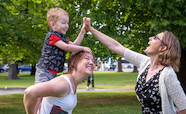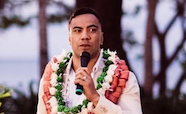Our Centre for Health, Activity and Rehabilitation Research (CHARR) achieves research impact by working in partnership with our communities to improve health outcomes.
CHARR's research impacts:
- Discovery and pathfinding research contributing to new knowledge
- Improving understanding of the mechanisms underpinning movement and function
- Research-informed teaching for our health professionals
- Improved assessment and treatment practices used by practitioners
- Local government and national public policy making affecting our health services and physical environments
- Resources for communities to self-manage rehabilitation and maintain good health
Research impact in action
Case study: Improving access to parks for persons with a disability
“Having the reputation of Otago University and the Physiotherapy School in behind what we're doing, having that name attached to the Playable Porirua work has just been valuable to getting councillors on board, getting the community on board and telling people that we are serious about accessible playgrounds and parks.”
Olivia Dovey – Parks Manager, Porirua City Council

Dr Meredith Perry developed an evaluation tool called PARCs to determine whether a park meets disability access requirements. This tool has been embraced by communities and local government and has sparked new initiatives.
Read the full case study:
Improving access to parks for persons with a disability
Culturally responsive services for Pasifika children
 Otago Master of Physiotherapy student Oka Sanerivi is investigating culturally nuanced approaches to treating Pasifika families, particularly how physiotherapists could and should be providing culturally responsive services to Pasifika children in Aotearoa. This research explores a gap of knowledge in the profession nationally and internationally.
Otago Master of Physiotherapy student Oka Sanerivi is investigating culturally nuanced approaches to treating Pasifika families, particularly how physiotherapists could and should be providing culturally responsive services to Pasifika children in Aotearoa. This research explores a gap of knowledge in the profession nationally and internationally.
He will be developing a clinical guideline and/or model of health that will be shared freely with the Physiotherapy Board of New Zealand, all the schools of physiotherapy in Aotearoa and the wider Pacific, as well as with Māori and Pasifika health professional groups.
“These resources will provide clinicians and educators with guidance on the best practice for working with Pacific children in Aotearoa, with the expectation that this would improve the quality of the interactions between physiotherapists and their Pacific paediatric patients. This would lead to optimised health outcomes for our children and families.”
Read Oka Sanerivi's story:
Physiotherapy student leading the way for Pacific peoples